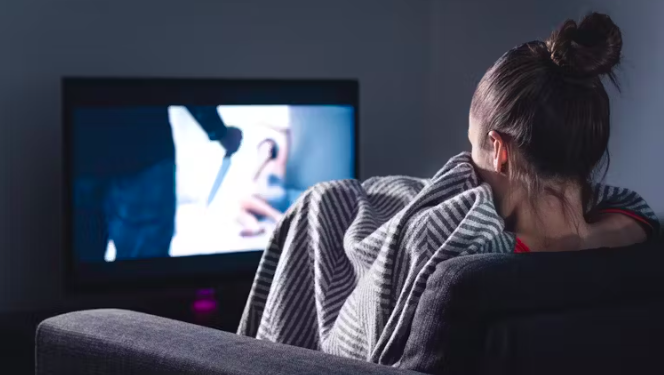The creeping shadows and haunting decorations transform the everyday into something eerie at Halloween. And you might be thinking about scaring yourself with a good horror movie.
Grotesque imagery, extreme violence, startling jump scares and menacing characters are common elements, making viewers feel fear, dread and disgust.
We generally aim to avoid these negative emotions in our everyday lives.
So why would some people seek them out, and enjoy them, in horror movies?
1. Fear can be thrilling
There is lots of overlap between the emotions of fear and excitement. In both, stress hormones are released that can produce physical symptoms such as increased heart and breathing rates, sweating and muscle tension. People also feel more alert and “on edge”.
Research has consistently shown people with personalities that crave intense emotional experiences, including fear and excitement, tend to enjoy horror movies.
But for more fearful people, the jump scares and violent scenes can be too intense. This can result in coping behaviours such as looking away or putting their hands over the ears, especially if they are highly immersed in the movie.
Although, if they also happen to enjoy intense emotion, they may still enjoy the thrill of the ride.
2. There’s a sense of relief
People may enjoy horror movies because of a sense of relief after a scary moment has passed.
Watching a horror movie can be a bit of an emotional rollercoaster, with distinct peaks and troughs of fear and relief over the course of the film.
For example, in the 2017 movie It the main protagonists survive a series of scary encounters with a demonic clown. The scary moments are separated by calmer scenes, prompting a rollercoaster of emotions.
In the classic 1975 movie Jaws, viewers experience relief from the scary moments, only to be scared again and again.
3. They satisfy our morbid curiosity
Many horror movies feature supernatural themes and characters such as zombies, werewolves and vampires. So horror movies can help satiate a morbid curiosity.
The violence, death, destruction and grotesque elements can provide curious people a safe space to explore things that are not safe (or socially appropriate) in the real world.
4. We can work out our limits
Horror movies can reflect our deepest fears and prompt introspection about our personal thresholds of fear and disgust.
So some people may enjoy watching them to get a better understanding of their own limits.
Watching horror might also be a way to push personal boundaries to potentially become less fearful or grossed out by things in real life.
In a study one of us (Coltan) conducted, horror movie fans reported less psychological distress during the early months of the COVID pandemic compared with people not identifying as a horror movie fan.
5. They can be social
Some people say the social aspect of watching horror movies with others is a big part of their appeal.
Watching with others might help some people feel safer. Alternatively, this might help amplify the emotional experience by feeding off the emotions of people around them.
Horror movies are also a common pick as a date night movie. Being scared together gives a good excuse to snuggle and take comfort in each other.
6. They give us pleasure in other people’s misery
Horror movies can provide the pleasurable emotion we feel when witnessing the misfortune of others, known as schadenfreude. This occurs most when we feel the person experiencing misfortune deserves it.
In many horror movies the characters that suffer a gruesome fate are only side characters. Much of the time these unfortunate souls are made out to be unlikeable and often make foolish choices before their grisly end.
For example, in the 1996 teen witch movie The Craft, the character Chris Hooker is portrayed as being cruel to women. Then he dies by being blasted out of a window.
Despite the grisly nature of horror movies, a study by one of us (Coltan) found horror fans seem to have the same levels of empathy as anyone else.
What do I make of all this?
Horror movies allow us to confront our deepest fears through the safety of make-believe.
People enjoy them for lots of different reasons. And the precise combination of reasons differs depending on the specific movie, and the person or people watching it.
What is certain though, is the increasing popularity of horror movies, with many to choose from.![]()
Shane Rogers, Lecturer in Psychology, Edith Cowan University; Coltan Scrivner, Behavioral Scientist, Arizona State University, and Shannon Muir, Lecturer in psychology, Edith Cowan University
This article is republished from The Conversation under a Creative Commons license. Read the original article.














